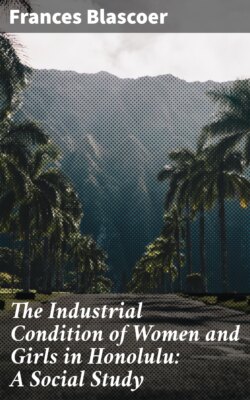Читать книгу The Industrial Condition of Women and Girls in Honolulu: A Social Study - Frances Blascoer - Страница 5
На сайте Литреса книга снята с продажи.
TO THE BOARD OF TRUSTEES OF KAIULANI HOME FOR GIRLS
ОглавлениеTable of Contents
The Industrial Committee of the Social Survey is composed of the following members:—
Bishop Restarick,
Miss Ida M. Pope,
Father Stephen,
Dr. Doremus Scudder,
Professor Edgar Wood,
Mrs. May Wilcox,
President A. F. Griffiths,
Miss Kemp (who takes Miss Bosher’s place),
Mrs. Walter F. Frear,
Mrs. Frederick J. Lowrey,
Miss Louise Gulick,
Miss Nora Sturgeon,
Mrs. Francis M. Swanzy, Chairman.
Its mission of inquiry into the condition of working girls and women in Honolulu has been conducted by three sub-committees, viz.—
(1) On Conditions in Homes.
(2) On Conditions of Work.
(3) On Conditions of Recreations and Amusements.
The first work done was in the way of inquiry into certain individual cases presented by Miss Blascoer; this brought helpful results. A seamstress inquiry was made by Mesdames Frear, Lowrey, Wilcox and Swanzy, in which 250 circulars were sent out. The various responses emphasize strongly the need of a training school for unskilled workers in this line. A stenographer and typewriter inquiry was conducted by Professor Wood, assisted by Messrs. George R. Carter, Walter Dillingham, A. F. Judd, G. P. Wilder and W. H. Baird, temporary members of the Sub-committee on Conditions of Work and constituting a representative group of business men especially interested. Perhaps the most interesting as well as most valuable inquiry was that into the social activities of the community, its Recreations and Amusements. President Griffiths prepared a list of the Public Amusements and, assisted by some twenty-six persons, undertook the investigation of the theatres, moving picture shows, dance halls, and parks. Mrs. Frear personally made a most exhaustive inquiry into the social activities of the many Churches of Honolulu, and Misses Bosher and Kemp did the same for the Schools; Miss Gulick did the work for the Missions and Settlements, Mrs. Lowrey for the several Miscellaneous Associations, while Mrs. Swanzy collected information regarding the fifty-odd Lodges and Fraternal Organizations.
Meetings of the Committee and the Sub-committees were held during the months of July, August, September, and October; the last, of the committee as a whole, was well attended and the discussion in connection with the outline of a constructive program kindly given by Miss Blascoer proved highly profitable. The reports of the sub-committees have been turned in to Miss Blascoer, whose digest of conditions she presents to your Board. A slight sketch of the reaction of this industrial inquiry on the persons who took part in it may, however, be of interest. Without exception the effect of this work has been most stimulating and beneficial, so that it may safely be said that whatever the final outcome to the community of the Social Survey, each individual of this committee has been helped to a better knowledge of existing conditions and to a broader outlook on life. Especially for the lay members windows have been opened in various directions. May I quote an opinion or two? One says:—“This inquiry has aroused interest. We have learned how other people’s work runs along the same lines as ours; there has been too much of ‘going it alone.’” Another:—“It has been a decided help and stirred interest and work; it has promoted discussion and information generally.”
The School inquiry, which elicited a very generous and valuable response, in several cases of public school teachers proved a direct stimulus and assistance in affording opportune suggestion for ways of recreation and amusement; while the fact that an extensive work is done by the Lodges and Fraternal Organizations was made evident by that inquiry—a work that is kindly as well as charitable, a work that is conducive to the development of friendly feeling and good will towards men. The social activities of these societies also cover a large field. The Church inquiry showed that an astonishing amount is done among some of our Honolulu congregations for the welfare and wholesome amusement of young people and adults, and the Church of Latter Day Saints may be cited as particularly active in looking after its people on week-days as well as Sundays.
One of our women members states that she finds her personal interest in the welfare of working girls greatly broadened and now has a better idea of the needs of girls from poor homes, particularly those who have had few opportunities. In connection with the work of the Industrial Committee several Amusement Circles for girls have been started in different parts of town by Miss Nora Sturgeon and a band of volunteer helpers, and interest in this line of effort has been directly incited among others who were drawn into the detail of investigation.
Finally, Dr. Scudder says that he has been thinking along these lines for twenty years and feels that this industrial inquiry will be of immense value in bringing to the notice of many who are also interested, a tangible plan of action as the result of knowledge of conditions. He intends speaking on the necessity for child labor laws, to be enacted by the next Legislature, so that the deplorable conditions existing in other countries need never be known here, and he will endeavor to enlist the sympathy and influence of his congregation. His own interest has been quickened, and he believes that the Kaiulani Home Board should be heartily congratulated on having been the means of instigating an inquiry which it is hoped will crystallize into some definite and concerted program for the betterment of social and industrial conditions in Hawaii nei.
Julie Judd Swanzy,
Chairman.
October 29, 1912.
